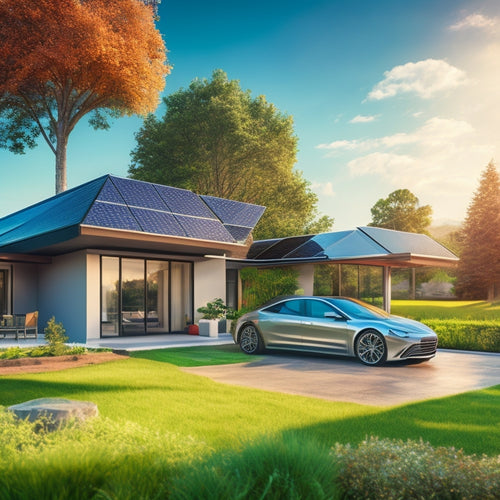
Is Solar Energy a Good Investment for Your Home?
Share
By investing in solar energy for your home, you can greatly increase your property value and slash your utility bills by up to 50%. With modern solar panels converting up to 22% of sunlight into electricity, solar energy is an abundant, renewable, and efficient way to reduce your reliance on fossil fuels. Although the initial investment costs may seem high, government incentives and tax credits can greatly reduce your expenses. As you examine the benefits of solar energy, you'll find out how it can promote energy independence, reduce your carbon footprint, and provide a substantial return on investment - and there's even more to reveal about how solar energy can change your home's energy environment.
Key Takeaways
- Solar energy is a good investment for your home due to its significant decrease in costs, making it competitive with fossil fuels.
- Long-term savings on energy bills and potential increase in property value contribute to overall financial benefits.
- Government incentives, tax credits, and financing options make solar energy a financially attractive choice.
- Solar energy provides energy independence, reduces reliance on the electrical grid, and promotes a sustainable energy future.
- Continuous advancements in solar technology enhance efficiency, lower costs, and increase the return on investment.
Understanding Solar Energy Benefits
As you consider investing in solar energy, it's essential to understand the benefits that make it a viable option. One significant advantage is the continuous solar technology advancements, which have increased efficiency and reduced costs. This has dispelled many solar energy myths, such as the notion that solar panels are inefficient or unreliable.
In reality, modern solar panels can convert up to 22% of sunlight into electricity, making them a reliable source of power.
You'll also benefit from the abundant and renewable nature of solar energy, reducing your reliance on fossil fuels and lowering your carbon footprint. Moreover, solar energy can increase your property value and provide a sense of energy independence.
In addition, many governments offer incentives and tax credits for individuals and businesses that invest in solar energy, making it an attractive option for those looking to reduce their energy costs.
Cost of Solar Panel Installation
You're likely wondering what it'll cost you to get started with solar energy.
The initial investment costs of solar panel installation can be substantial, but it's crucial to take into account the various factors that influence the installation price.
You'll also need to factor in ongoing maintenance expenses to guarantee your system operates efficiently over its lifespan.
Initial Investment Costs
Generally, homeowners and businesses alike are initially deterred from investing in solar energy due to the high upfront costs associated with solar panel installation. However, you shouldn't let the initial investment costs scare you off. With the right financing options and incentives, the cost of going solar can be more manageable than you think.
Some of the initial investment costs you'll need to evaluate include:
-
The cost of the solar panels themselves, which can range from $15,000 to $30,000 or more, depending on the size of the system and the quality of the equipment.
-
The cost of installation, which can add another $5,000 to $10,000 to the total bill.
-
Additional expenses, such as inverters, mounting hardware, and electrical hookups, which can add up to several thousand dollars more.
Fortunately, there are ways to offset these costs. For example, you may be eligible for tax credits, which can provide a significant reduction in your tax liability.
Additionally, many financing options are available, including loans and power purchase agreements, which can help spread the cost of going solar over time.
Installation Price Factors
Your solar panel installation price is influenced by several key factors, which can greatly impact the overall cost of going solar.
The installation location, for instance, affects the cost due to varying labor costs and local building codes. Panel orientation and system size also play a significant role, as they determine the number of panels required and the complexity of the installation.
The condition of your roof is another vital factor, as a damaged or old roof may require additional repairs or replacement before installing solar panels.
Financing options, such as loans or leases, can also impact the upfront cost. The type of inverter used, which converts DC power to AC, can vary in price depending on the quality and efficiency.
Additionally, installation permits, local incentives, and the installation timeline can influence the final cost.
Finally, the contractor you select can also impact the price, as their experience, reputation, and overhead costs can vary.
Understanding these factors will help you make an informed decision and get the best value for your solar panel installation.
Ongoing Maintenance Expenses
As solar panels begin generating electricity, homeowners often wonder about the long-term costs associated with maintaining their system. One major concern is the cost of solar panel upkeep.
Fortunately, maintenance costs are relatively low. You can expect to pay around $300 to $1,000 per year for routine maintenance, depending on the size of your system and the frequency of cleaning.
Here are some typical maintenance tasks and their associated costs:
- Inverter replacement: $1,000 to $3,000 every 10 to 15 years
- Panel cleaning: $100 to $300 per year, depending on the frequency
- Monitoring system maintenance: $100 to $300 per year
These costs are minimal compared to the savings you'll enjoy from generating your own electricity.
By factoring in these maintenance costs, you can accurately calculate the return on investment for your solar panel system.
How Solar Energy Saves Money
Savings accumulate like sunlight on a solar panel when you switch to renewable energy. By utilizing the power of the sun, you can greatly reduce your utility bills. In fact, you can save up to 50% on your energy costs, depending on your location and energy usage. This is because solar energy allows you to generate your own electricity, reducing your reliance on the grid.
In addition to lower utility bills, you'll also benefit from tax savings. The federal government offers a tax credit of up to 26% of the total cost of your solar panel system. This can translate to thousands of dollars in savings.
Moreover, many states and utilities offer additional incentives, such as rebates and net metering programs, which can additionally reduce your energy costs. By switching to solar energy, you can enjoy substantial savings and increase your home's value.
With the money you save, you can invest in other areas of your life, such as home improvements or retirement.
Environmental Impact of Solar
You're likely wondering how solar energy affects the environment.
By switching to solar power, you'll considerably reduce your carbon footprint, which is a major contributor to climate change.
Additionally, solar energy is an emission-free source of energy, producing no greenhouse gases or air pollutants during operation.
Reducing Carbon Footprint
Carbon emissions from fossil fuels have taken a devastating toll on the environment, and the clock is ticking to reverse the damage.
As you consider investing in solar energy for your home, you're likely motivated by a desire to reduce your carbon footprint and contribute to a more sustainable future.
By switching to solar power, you'll greatly decrease your reliance on fossil fuels and lower your carbon emissions.
Here are some key benefits:
- You'll reduce your carbon footprint, helping to combat climate change and its devastating effects on the environment.
- You'll be contributing to sustainable living, setting an example for others to follow in your community.
- You'll also be generating carbon offsets, which can be traded or sold to companies or individuals looking to offset their own emissions.
Energy Source Emissions
The environmental impact of solar energy is considerably lower compared to traditional fossil fuels. You'll find that solar energy produces no emissions, air pollutants, or greenhouse gases during operation.
In contrast, fossil fuels emit significant amounts of carbon dioxide, sulfur dioxide, and nitrogen oxides, contributing to climate change and air pollution.
When comparing energy source efficiency, solar energy outperforms fossil fuels. Solar panels convert sunlight into electricity with an efficiency rate of around 15-20%.
Fossil fuels, on the other hand, have an efficiency rate of around 33-40%. However, the energy conversion process for fossil fuels involves combustion, which leads to energy loss and increased emissions.
In a renewable energy comparison, solar energy stands out as a clean and efficient option.
It's crucial to evaluate the environmental impact of your energy source, as it directly affects the planet's ecosystem. By choosing solar energy, you're reducing your carbon footprint and contributing to a cleaner, healthier environment.
Government Incentives for Solar
As governments worldwide acknowledge the urgency of shifting to renewable energy sources, they're offering attractive incentives to encourage individuals and businesses to invest in solar energy.
These incentives can greatly reduce the upfront cost of installing solar panels, making it a more viable option for you.
You can take advantage of various government incentives, including:
-
Federal tax credits: You can claim a tax credit of up to 26% of the total cost of your solar panel system.
-
State rebates: Many states offer rebates or cashback incentives for installing solar panels.
-
Local incentives: Local governments may offer additional incentives, such as property tax exemptions or low-interest financing options.
Additionally, you can investigate financing options like solar leasing, which allows you to rent solar panels for a fixed monthly fee.
Net metering is another benefit, where you can sell excess energy back to the grid and offset your energy bills.
Increased Property Value
When you install solar panels, you're not only generating clean energy, but you're also increasing your property's value.
By elevating your home equity, you'll have more financial flexibility and security.
Additionally, the enhanced curb appeal of solar panels can make your property more attractive to potential buyers if you decide to sell in the future.
Boosting Home Equity
Installing solar panels can increase your property value by up to 17%, according to a study by the National Renewable Energy Laboratory. This enhancement in property value directly translates to a significant increase in your home equity.
As a homeowner, you're not just investing in a renewable energy source, but also in your property investment.
By going solar, you're making a smart decision that can pay off in the long run. Here are some benefits you can expect:
-
A higher selling price: With solar panels, your home becomes more attractive to potential buyers, leading to a higher selling price and increased home equity.
-
A reduced payoff period: The increased value of your property can help you pay off your mortgage faster, giving you more financial flexibility.
-
A competitive edge: In a crowded real estate market, having solar panels can be a unique selling point that sets your property apart from others, making it more desirable to buyers.
Enhanced Curb Appeal
Solar panels don't just generate clean energy; they also improve your home's visual appeal. A well-designed solar panel system can raise your home's curb appeal, increasing its value and potentially enhancing its selling price.
You'll want to take into account solar panel aesthetics, such as the color and frame style, to guarantee they complement your home's exterior. For instance, black solar panels with a sleek, thin frame can blend seamlessly with modern design.
Additionally, landscaping factors come into play when installing solar panels. You'll need to verify that surrounding vegetation doesn't obstruct sunlight or create shading issues. Pruning or removing trees and shrubs may be necessary to optimize energy production.
By carefully planning your solar panel installation, you can create a visually appealing and functional system that adds value to your property. This increased property value can be a significant selling point, making your home more attractive to potential buyers.
With solar panels, you're not only generating clean energy but also making a wise investment in your home's future.
Solar Energy System Maintenance
Reliability is key to maximizing the return on your solar energy investment, and regular system maintenance plays a critical role in guaranteeing peak performance. You need to stay on top of system maintenance to make certain your solar energy system operates efficiently and effectively.
To keep your system running smoothly, you should:
- Perform regular solar panel cleaning to remove debris and dirt that can reduce energy output
- Conduct inverter maintenance to guarantee peak energy conversion and prevent downtime
- Prioritize battery upkeep to maintain energy storage capacity and extend its lifespan
Additionally, you should schedule system inspections to identify and address potential issues before they become major problems. Performance monitoring and warranty coverage can also provide peace of mind and protection for your investment.
Energy Independence With Solar
By optimizing your solar energy system's performance through regular maintenance, you're well on your way to achieving a significant reduction in your reliance on the grid. This means you'll be enjoying a greater level of energy autonomy, where you're in control of your energy usage and costs.
With solar energy, you can break free from the unpredictability of utility rates and reduce your exposure to price hikes.
As you move towards energy independence, you'll also be building solar resilience into your daily life. This means you'll be better equipped to handle power outages and grid disruptions, ensuring that your home remains powered and comfortable even when the grid goes down.
By utilizing the power of the sun, you'll be taking a proactive approach to energy management, reducing your reliance on external energy sources and securing a more sustainable future for yourself and your family.
With solar energy, you're not just saving money – you're taking control of your energy destiny.
Disadvantages of Solar Energy
As you weigh the benefits of solar energy, it's vital to reflect on the flip side of the coin: the disadvantages that come with utilizing the power of the sun.
While solar energy can be a transformative solution for your home, it's important to evaluate the potential drawbacks.
One significant limitation is the variability of solar energy generation. Since solar panels rely on sunlight to produce electricity, their output is affected by weather conditions, seasonal changes, and time of day.
This means that your solar panel efficiency may be compromised during periods of low sunlight.
Additionally, reflect on the following disadvantages:
-
High upfront costs: While the cost of solar panels has decreased over the years, the initial investment can still be substantial.
-
Limited battery storage options: If you want to store excess energy generated during the day for use at night or during power outages, you'll need to invest in a battery storage system, which can add to the overall cost.
-
Intermittent energy supply: Solar energy is an intermittent source of power, meaning it's not always available when you need it, which can be a challenge, especially during periods of high energy demand.
Is Solar Energy Worth It
Your decision to invest in solar energy hinges on one critical question: is solar energy worth it? The answer lies in the numbers.
Solar panel efficiency has increased considerably over the years, with modern panels capable of converting up to 22% of sunlight into electricity. This means you can generate more power with fewer panels, making solar energy a more viable option.
As renewable energy trends continue to shift towards cleaner and more sustainable sources, solar energy is becoming increasingly competitive with fossil fuels. In fact, the cost of solar energy has dropped by over 70% in the last decade, making it a more affordable option for homeowners.
Additionally, solar energy can increase your property value, reduce your carbon footprint, and provide a sense of energy independence. With the right system and installation, solar energy can be a worthwhile investment for your home, providing a strong return on investment and a cleaner, more sustainable future.
Frequently Asked Questions
Can I Install Solar Panels on a Rented Property?
You can't install solar panels on a rented property without your landlord's permission, but you can investigate a solar lease or negotiate with your landlord to guarantee your tenant rights are protected in the agreement.
Do Solar Panels Work During Power Outages?
You'll be pleased to know that solar panels don't work during power outages, but you can stay powered up with a backup battery system, which guarantees continued energy supply, even when the grid fails, maintaining ideal solar panel efficiency.
Are Solar Panels Resistant to Extreme Weather Conditions?
You'll be relieved to know that solar panels are designed to withstand extreme weather conditions, ensuring weather durability through strong materials and construction that can resist heavy rain, hail, and high winds.
How Long Do Solar Panels Last Before Replacement?
You'll find that solar panels typically last around 25-30 years before replacement, with some manufacturers guaranteeing up to 40 years, but regular maintenance, like cleaning and inspecting, is vital to guarantee peak performance and extend their lifespan.
Can I Install Solar Panels on a Shaded Roof?
You can install solar panels on a shaded roof, but it'll impact solar energy efficiency. Assess shaded roof benefits, like reduced heat gain, and consider a microinverter or power optimizer to maximize energy output.
Related Posts
-

What Solar Panels Work Best With EVS Online?
When shopping for solar panels online to power your electric vehicle, look for high-efficiency models that can withst...
-

Charging Points in Rural Areas: 5 Key Insights
When driving through rural areas, you'll face a shortage of charging points, making EV ownership stressful and inconv...
-

5 Ways Bike Sharing Boosts Urban Sustainability
As you explore bike-sharing options, you'll discover five ways it boosts urban sustainability. By reducing congestion...


